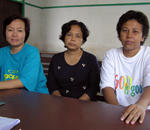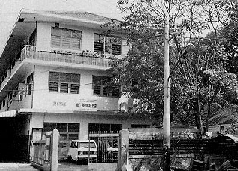 For many Jakartans, particularly the poor, the death of a relative can be a double blow. They mourn because their loved one has gone forever and because they have to pay a lot of money to greedy cemetery officials in order to secure a plot in a much-neglected public cemetery owned by the city administration. For rich people, however, there are several cemeteries around Jakarta where they can build a grand tomb for their deceased. This week's cover story highlights the issue. By Leony Aurora, The Jakarta Post
For many Jakartans, particularly the poor, the death of a relative can be a double blow. They mourn because their loved one has gone forever and because they have to pay a lot of money to greedy cemetery officials in order to secure a plot in a much-neglected public cemetery owned by the city administration. For rich people, however, there are several cemeteries around Jakarta where they can build a grand tomb for their deceased. This week's cover story highlights the issue. By Leony Aurora, The Jakarta Post
Yola dreads the days when she has to visit her mother's grave.
"I don't like being reminded that she's dead. I'd much rather celebrate her life," said the 22-year-old student. "Her grave means little to me."
Still, she was furious upon seeing what had happened to her mother's grave in the Christian Pandu public cemetery in Bandung.
Yola's father had designed the grave carefully, etching symbols to represent the family -- which his wife cherished most in life -- and surfaced it with black marble tiles. He erected a tall chain-link fence surrounding the two-by-three-meter grave to keep goats from eating the flowers.
On a visit one year after her mom's death, Yola could not find the grave. "It was always difficult for me to spot it as the cemetery was a right-royal mess, with graves placed haphazardly," she said.
Then she saw why it was extra hard to recognize it: there was nothing left of the fence except the frame. Thieves had removed the chain link to sell.
"My father was heartbroken. I was fuming," she said.
Three months later, the family found the bigger parts of the marble chipped. Yola's father replaced the marble with plain stone.
"There is no respect for the dead, nor for the living family. None at all," said Yola.
In a world where nothing is certain but death and taxes, one would think that a decent final resting place was the least a person should have. Nevertheless, facts show that the dead in Indonesia are often treated as nothing more than decaying flesh and bones. Gone. Unimportant.
A poor family in Jakarta has to spend at least Rp 1 million (US$99) -- more than a month's minimum wage -- to have a grave in a public cemetery dug, cover the rent on a tarpaulin for the funeral and for the three-year lease on a two-by-one meter plot.
The city budget supposedly covers the cost of graves for the poor -- as stipulated in an article in the Constitution saying that the poor will be cared for by the state.
Middle-class families such as Yola's can arrange a proper burial, as long as they are willing to accept a grave in any available space in a cramped cemetery. Even after paying monthly service fees to the head of graveyard, they may see the graves that they lovingly build stripped of anything of value.
Those who bury their loved ones in public cemeteries then have to pray that the local administration will not suddenly decide to build on the site, as happened in 1997 when the mayor's office was relocated to a grand office built on four hectares of a graveyard.
The rich, of course, have more options. They can buy land for Rp 500,000 to Rp 2 million a square meter in a private cemetery, where maintenance and security services are available at a price.
After acquiring pieces of land at 10 times the actual price in surrounding areas, wealthy families can build grandiose tombs that can cost over Rp 1 billion.
One can argue that a cemetery is not a vital facility -- the dead can no longer feel anything and the space could be used for the living.
Although there is some truth in this, it fails to address the needs of those on earth who need the grave to grief and to heal. Yola's father visits his wife's grave regularly, even though she has been gone for four years.
The question of whether a decent grave is a luxury or a necessity may remain open, but current conditions seem to indicate that the former is more the case.
For Yola, the best kind of cemetery would be one similar to the cemetery for Dutch soldiers located next to the Pandu cemetery.
There are rows and rows of white crosses, distanced precisely from one another, on an expanse of grass. There are no thugs portraying as grave cleaners, ready to demand money from every visitor. "The cemetery is modest and yet strikingly beautiful. All men are equal in the eyes of God, and their graves should be equal as well," said Yola.
 VATICAN CITY, Oct 30 (Reuters) - Pope Benedict offered his deepest sympathies on Sunday to the families of three Christian girls beheaded in Indonesia as they walked to school near a Muslim town.
VATICAN CITY, Oct 30 (Reuters) - Pope Benedict offered his deepest sympathies on Sunday to the families of three Christian girls beheaded in Indonesia as they walked to school near a Muslim town. 







